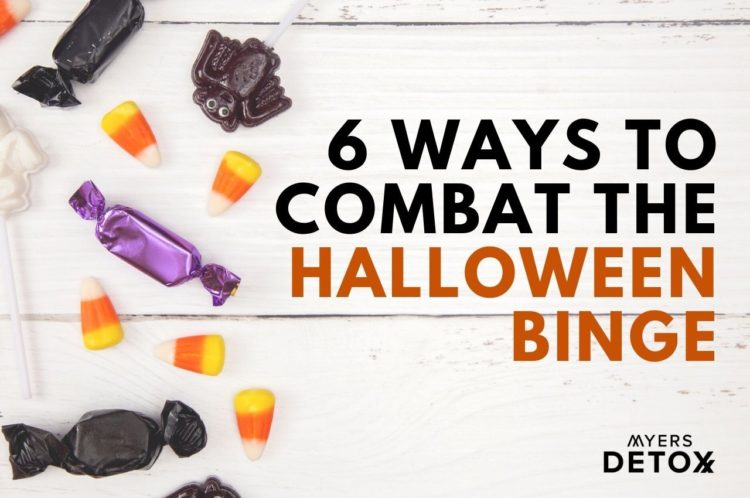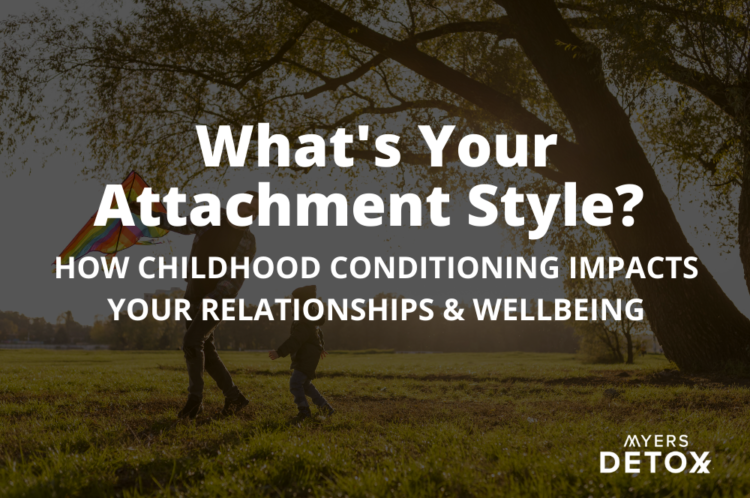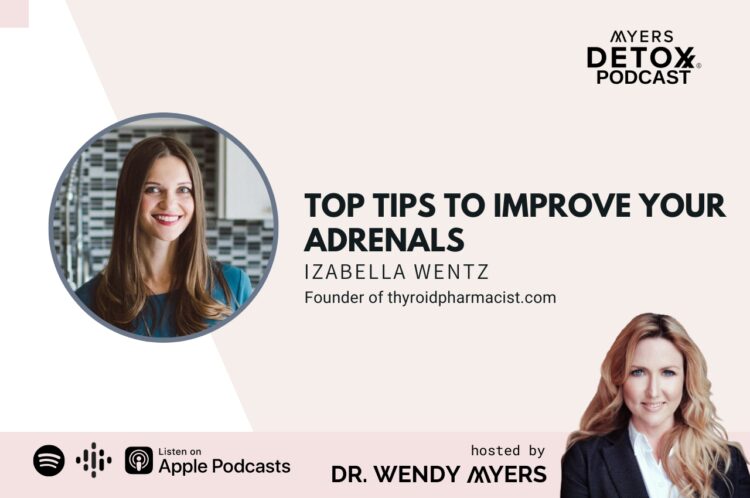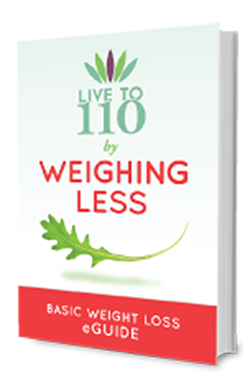6 Ways to Combat the Halloween Binge

Halloween can be just as fun for the adults as it is for the kids. The adorable trick or treaters, the scary movies, and of course… the opportunity to indulge in some of your favorite Halloween treats.
Unfortunately, most of those treats are packed with sugar (not to mention other low-quality ingredients) and can send your body on a sugar rollercoaster.
If you’re like most health-conscious people these days, you’re likely trying to cut back on your sugar intake. Even if you consciously choose not to add sugar to your coffee in the morning, or you try to skip desserts, sugar can still be found in everything from bread to sauces.
That may be why two hundred years ago, people consumed around two pounds of sugar a year, and today the average American consumes around 152 pounds of sugar each year. Let that sink in…that’s three pounds a week. In other words, most American’s now consume more sugar in one week than someone would consume in an entire year two hundred years ago… that’s staggering information, to say the least[1].
So how can you enjoy Halloween and all the fun that comes along with it without going overboard on the sugar?
In this article, you’ll learn:
- What sugar does to your liver
- Some tips and tricks to avoid overdoing it on sugar at Halloween
- How to combat the sugar rollercoaster
- The crucial step to take if you overindulge
- How sugar impacts your detox pathways
How Sugar Consumption Impacts Your Liver
It’s no secret that the standard American diet (SAD) is linked to a myriad of chronic diseases like obesity, diabetes, and heart disease. While there are many aspects of SAD that contribute to detrimental health outcomes, sugar is one of the most troublesome[2].
This is likely due to the fact that at its core, sugar consumed in excess can increase the amount of inflammation in your body. Inflammation, in turn, is understood to be one of the underlying factors in almost every chronic disease[3][4][5].
When you consume a meal or treat that’s high in sugar, it puts your liver and digestive enzymes to work. Your digestive tract readily absorbs sugar, so your blood gets bombarded with a cascade of sugar (glucose) almost immediately after you indulge. This sets off signals to your pancreas to release the hormone insulin, which in turn shuttles that sugar out of your blood and into your cells.
Your liver is responsible for both storing and manufacturing glucose (sugar). When your blood sugar is high, your liver will store glucose (in the form of glycogen), and it will convert the excess to fat. Over time, this accumulation of fat in your liver can turn into a condition called nonalcoholic fatty liver disease (NAFLD). NAFLD is one of the most damaging conditions for your liver, as it can eventually lead to cirrhosis[6].
The Addictive Nature Of Sugar
Although NAFLD is a result of chronic sugar overconsumption, the danger with short-term sugar binges lies in sugar’s addictive quality. Have you ever found yourself on a sugar bender after Thanksgiving or Christmas? It can be incredibly difficult to say no to that cake or pie sitting in the refrigerator once you’ve got yourself on a sugar rollercoaster.
The same pathways in your brain that are activated by addictive drugs are also activated by sugar. From an ancestral perspective, this makes sense — sugar equals a quick form of energy, and you need energy to survive. Of course, your hunter-gatherer ancestors weren’t eating snickers bars; they were fueling themselves with fiber-rich berries.
Research shows that sugar consumption, due to its ability to release opioids and dopamine, can result in the binging — withdrawal — craving cycle that’s remarkably similar to that of addictive drugs[7].
Does this mean you must avoid sugar at all costs? Not necessarily. Like any other substance, sugar can be enjoyed responsibly if you have the right tools in place to moderate yourself.
6 Ways To Have A Healthier Halloween
No one wants to be the house handing out raisins on Halloween. But how do you enjoy this fun evening of trick or treating without buying a one-way ticket for a sugar rollercoaster? Below are some tips to help you have a healthier, more balanced Halloween.
#1 Use Portion Control and Mindful Eating
One of the best ways to enjoy the food you love thoroughly is to eat mindfully. Along with portion control, mindful eating allows you to get the most out of your food, without going overboard.
Begin by creating some thoughtful boundaries with yourself. Throw away judgment and shame, and give yourself permission to enjoy your candy mindfully. One of the tenants of mindfulness is to observe yourself without judgment. Once judgment comes into the picture, you are no longer able to be objective about your experience and, therefore, you are no longer in control of your experience — your emotions are.
One or two pieces of candy aren’t going to ruin your health. Pick a couple of your favorites, and make the intentional choice to enjoy one of two pieces mindfully.
When you eat mindfully, you’re using all of your senses. Notice the size and shape of your treat. Does it have a smell? Pay attention to the way it feels in your hand, and then the texture it has in your mouth. Chew slowly, noticing all the different flavors. Does the flavor change from the beginning of the bite to the end? Is there an aftertaste?
Chew each bite thoroughly, don’t let one ounce of the experience go unnoticed. Allow the flavor to linger in your mouth as long as possible before taking the next bite. This way you’ll get the most satisfaction out of your treat.
When you eat mindfully and slowly like this, you not only get to enjoy your food more intensely, but it takes less to satisfy you. This is due to the fact that it takes about 20 minutes for your brain to get the message from your stomach that you are satisfied. Therefore, if you give yourself time to enjoy your food, your brain has time to catch up to the experience[8].
Mindful eating is not only helpful for managing sugar cravings, but it’s an excellent way to enhance weight loss efforts[9].
#2 Out Of Sight, Out Of Mind
This one is pretty straight forward, but shouldn’t be underestimated. One of the best ways to avoid temptation…is to avoid temptation.
Instead of keeping your extra candy in your kitchen or in a bowl by the door, put it away somewhere where you won’t see it. This may be a drawer that you rarely use, the garage, or you could even freeze it.
If you really can’t keep your hands off the sweets, you can also just give it away to a neighbor or a friend. Even throw it away!
#3 Eat Dinner
Some people try to cut corners when they know they’re in for some treats by skipping meals. This is a huge mistake.
When you skip a meal to save calories for later, you not only set yourself up for a binge (I mean, you’re starving, right?), but you also miss out on the benefits of being satiated.
Research shows that consuming a protein-rich meal can help you feel more satisfied, and therefore reduce sugar cravings. Instead of skipping dinner on Halloween, a better bet is to prepare yourself a protein-rich meal full of fiber-rich veggies. This will keep you satisfied and content, so you can enjoy your treats mindfully[10][11].
If you really want to set yourself up for success, have a protein-rich breakfast too. Research shows that when you start your day with protein, you’re much less likely to experience cravings later in the day[12].
#4 Buy Your Least Favorite Candy
One of the best ways to avoid overeating Halloween candy is to not buy your favorite kind. Not a huge fan of coconut? Grab some coconut candy. Could you go without sour treats? Opt for Sour Patch Kids or Nerds.
The best way to fight the temptation of Halloween treats is to avoid it altogether. And don’t worry — there are plenty of houses out there handing out your personal favorites, so the trick or treaters won’t miss out.
You can also opt to give organic candy. There are organic chocolate, lollipops and other natural treats. They still have sugar, but at least will be somewhat healthier for the kids (and you).
#5 Watch Out For Artificial Sweeteners
You may come across some candy that’s marketed as “sugar-free.” While in theory, this may sound like the perfect workaround — beware of artificial sweeteners.
Some artificial sweeteners are neurotoxins. They may cut down the sugar content of your food, but the toxic effect they can have on your brain far outweighs the benefits of sugar reduction[13].
Artificial sweeteners have also been linked to weight gain, as some of these substances send the same signals to your body to store weight as regular old sugar does.
Some sweeteners to watch out for include; saccharin, aspartame, sucralose, neotame, and acesulfame potassium[14][15].
#6 Look For Treats With Natural Sugar-free Sweeteners
The good news is, not all sugar-free treats come with toxic artificial sweeteners. There are a handful of sweeteners that not only replace sugar, but they also impart their own health benefits.
Stevia and monk fruit are two sugar alternatives that offer a sweet taste, along with antioxidant compounds. Stevia, in particular, has been studied for its blood sugar-regulating activity. It appears that stevia helps to sensitize your cells to insulin, helping them take up and utilize any glucose in your blood[16][17][18].
Erythritol and xylitol are two more healthy sugar alternatives that you can look for. These are sugar alcohols, which means that your intestines absorb only a small amount, if any, of these compounds. Instead, they move through your digestive tract and act as food for your gut bacteria. Some people do notice digestive issues like loose stools with sugar alcohols, but erythritol is the most well tolerated, with xylitol right behind it[19].
What To Do If You Overindulge
If you find that you went a little overboard on sugar, there are a few things you can do to help your body get back into balance.
Drink Plenty Of Water
When you overindulge on sugar, one of the side effects is dehydration. This can make you feel tired, groggy, and moody. Similarly, when you’re dehydrated, it’s easier for your body to experience hyperglycemia (high blood sugar) as your kidneys work to clear your body of excess glucose.
Therefore, if you plan on indulging in some sweets, it makes sense to hydrate before. And if you accidentally find yourself eating a bit too many sweets, it’s never too late to start hydrating yourself[20][21].
Move Your Body
One of the fastest ways to process sugar is to use it. If you got yourself on a little sugar high — take advantage of the excess glucose and move your body. This could mean going for a little power walk, a short run, doing some strength training, or even just getting outside and playing with the kids or the dog. This will help to clear the sugar out of your bloodstream easier.
Support Your Liver With Targeted Nutrients
As previously mentioned, consuming a lot of sugar puts pressure on your liver. Once it’s in your system, you’re either going to use it immediately, or your liver has to work with it. Therefore, one of the best ways to support your body after a sugar binge is to give your liver some love.
A few research-backed foods and herbs that support liver health include beets, dandelion root, milk thistle, and broccoli sprouts[22][23][24][25].
Your Ultimate Liver Support
If there is one organ in your body that could use all the help it can get — it’s your liver. Responsible for over 500 vital functions, your liver does everything from supporting digestion to supporting your natural detox pathways so that your body may clear itself of unwanted compounds[26].
While there are plenty of liver cleansing supplements out there, most people don’t realize that to truly support your liver; you also need to support your digestion. The reason for this is two-fold: a healthy digestive tract will allow in fewer toxins, and you need to be able to rid your body of the toxins that your liver processes through your digestive tract.
That’s why I formulated Daily Detox*, which includes a unique blend of liver-supportive nutrients, accompanied by digestive support (fiber blend), metabolic support, and organic superfoods.
You can think of Daily Detox as your one-stop-shop for liver love. Sugar can be a menace to your liver, but it’s also pretty hard to avoid. Adding a supplement like Daily Detox to your routine offers a safety net, so you don’t have to feel so guilty if you overindulge.
To be clear — I am not recommending you go out and binge on candy and then take Daily Detox to repent. However, supporting your liver is your most effective first step in bringing your body back into balance when sugar slip-ups happen (you’re only human after all!).
Happy Halloween!!
*These statements have not been reviewed by the FDA. Daily Detox is a dietary supplement and is not intended to diagnose, treat, cure, or prevent any disease. It is not intended to replace any medication or healing modality prescribed by your medical doctor. Please consult with your doctor before beginning a new supplement regimen.
Click Here for References+
-
Furman, David, et al. “Chronic inflammation in the etiology of disease across the life span.” Nature medicine 25.12 (2019): 1822-1832.
-
Schulze, Matthias B., et al. “Dietary pattern, inflammation, and incidence of type 2 diabetes in women–.” The American journal of clinical nutrition 82.3 (2005): 675-684.
-
Giugliano, Dario, Antonio Ceriello, and Katherine Esposito. “The effects of diet on inflammation: emphasis on the metabolic syndrome.” Journal of the American College of Cardiology 48.4 (2006): 677-685.
-
Basaranoglu, Metin, Gokcen Basaranoglu, and Elisabetta Bugianesi. “Carbohydrate intake and nonalcoholic fatty liver disease: fructose as a weapon of mass destruction.” Hepatobiliary surgery and nutrition 4.2 (2015): 109.
-
Avena, Nicole M., Pedro Rada, and Bartley G. Hoebel. “Evidence for sugar addiction: behavioral and neurochemical effects of intermittent, excessive sugar intake.” Neuroscience & Biobehavioral Reviews 32.1 (2008): 20-39.
-
https://www.health.harvard.edu/staying-healthy/mindful-eating
-
Asadollahi, T., et al. “Effectiveness of mindfulness training and dietary regime on weight loss in obese people.” Journal of medicine and life 8.Spec Iss 4 (2015): 114.
-
Anton, Stephen D., et al. “Diet type and changes in food cravings following weight loss: findings from the POUNDS LOST Trial.” Eating and Weight Disorders-Studies on Anorexia, Bulimia and Obesity 17.2 (2012): e101-e108.
-
Paddon-Jones, Douglas, et al. “Protein, weight management, and satiety.” The American journal of clinical nutrition 87.5 (2008): 1558S-1561S.
-
https://www.sciencedaily.com/releases/2011/05/110519113024.htm
-
Maher, Timothy J., and Richard J. Wurtman. “Possible neurologic effects of aspartame, a widely used food additive.” Environmental health perspectives 75 (1987): 53-57.
-
Sharma, Arun, et al. “Artificial sweeteners as a sugar substitute: Are they really safe?.” Indian journal of pharmacology 48.3 (2016): 237.
-
Tandel, Kirtida R. “Sugar substitutes: Health controversy over perceived benefits.” Journal of pharmacology & pharmacotherapeutics 2.4 (2011): 236.
-
https://link.springer.com/referenceworkentry/10.1007%2F978-3-319-27027-2_6
-
Chen, W. J., et al. “The antioxidant activities of natural sweeteners, mogrosides, from fruits of Siraitia grosvenori.” International journal of food sciences and nutrition 58.7 (2007): 548-556.
-
https://www.sciencedaily.com/releases/2017/04/170411104441.htm
-
Mäkinen, Kauko K. “Gastrointestinal disturbances associated with the consumption of sugar alcohols with special consideration of Xylitol: scientific review and instructions for dentists and other health-care professionals.” International journal of dentistry 2016 (2016).
-
Roussel, Ronan, et al. “Low water intake and risk for new-onset hyperglycemia.” Diabetes care 34.12 (2011): 2551-2554.
-
Yoshida, Kazutaka, et al. “Broccoli sprout extract induces detoxification-related gene expression and attenuates acute liver injury.” World Journal of Gastroenterology: WJG 21.35 (2015): 10091.
-
Clifford, Tom, et al. “The potential benefits of red beetroot supplementation in health and disease.” Nutrients 7.4 (2015): 2801-2822.
-
Hamza, Alaaeldin Ahmed, et al. “Dandelion prevents liver fibrosis, inflammatory response, and oxidative stress in rats.” The Journal of Basic and Applied Zoology 81.1 (2020): 1-13.
-
Mulrow, C., et al. “Milk thistle: effects on liver disease and cirrhosis and clinical adverse effects: summary.” AHRQ Evidence Report Summaries. Agency for Healthcare Research and Quality (US), 2000.
-
https://www.hopkinsmedicine.org/health/conditions-and-diseases/liver-anatomy-and-functions









